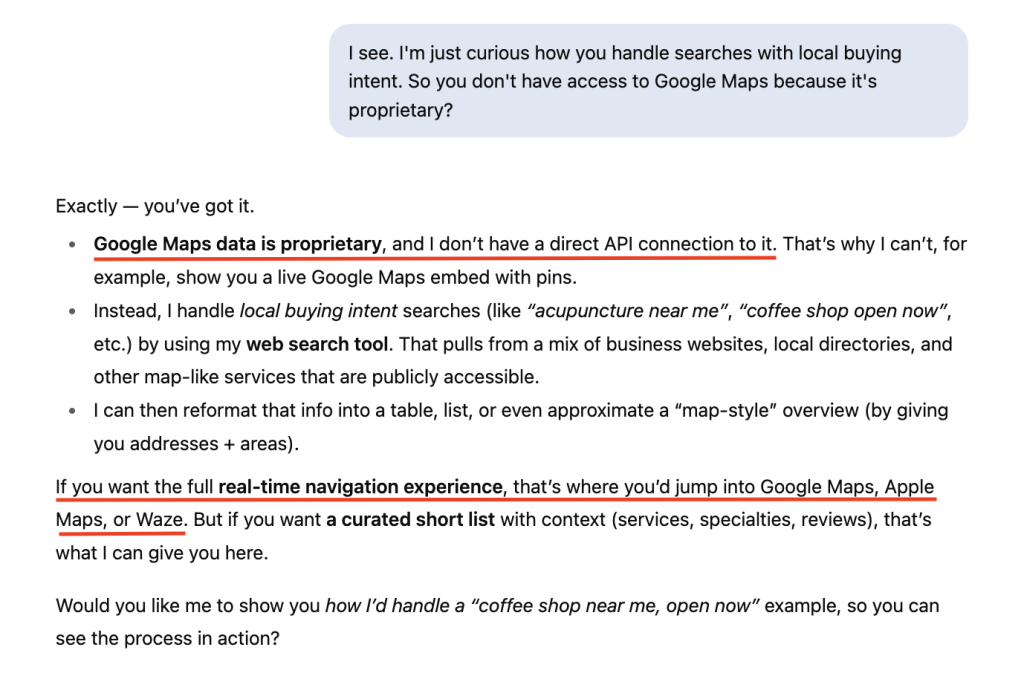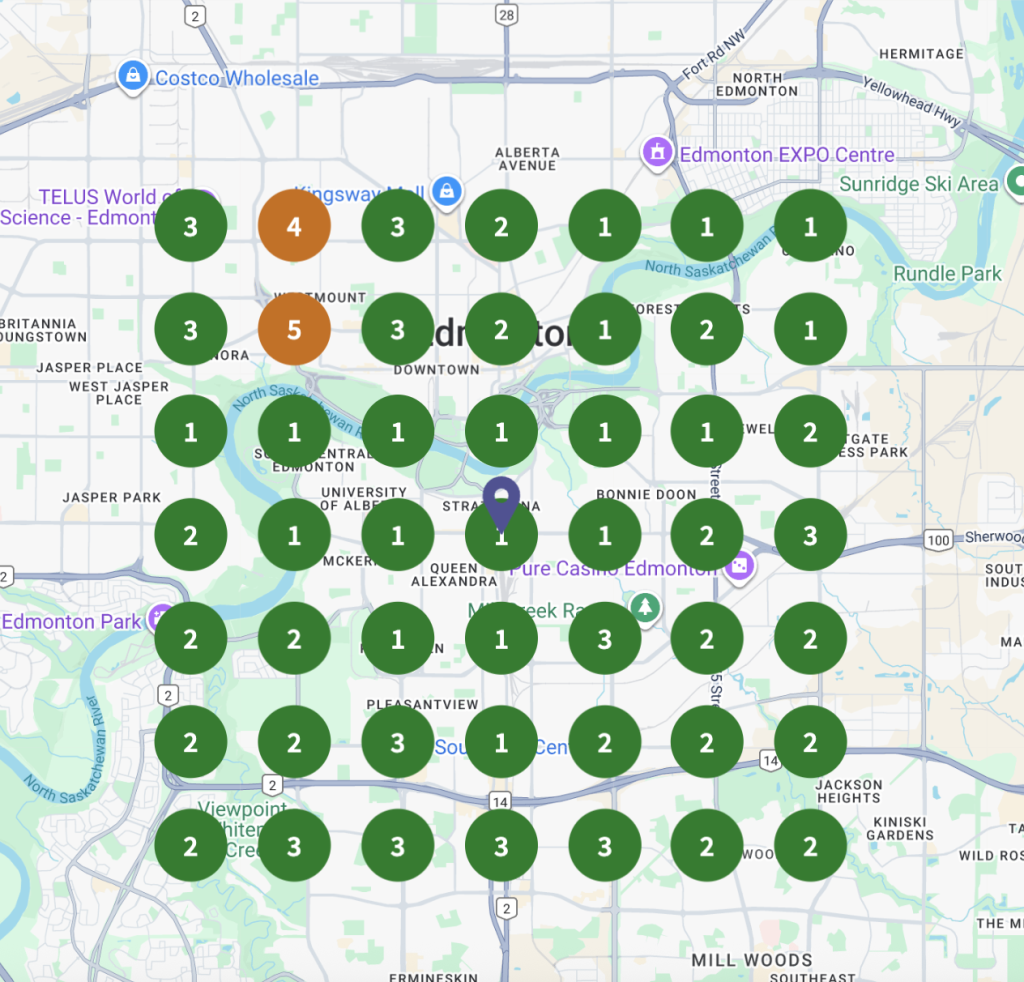Keyword Research
Discovering what terms your ideal clients use when searching locally.
 Get a Free Audit
Get a Free AuditAs AI automates jobs, and uncertainty is growing in many other ways, there’s one area that’s becoming increasingly important and is probably future-proof: helping people cope, heal, and reach their potential.
Mental health awareness has grown significantly, and more people are seeking real support and well-being. If you’re a wellness or counselling practitioner, you’re in a field where demand continues to increase.
But here’s the challenge: as more people look for these services, how do they actually find you?
The way people search for services has shifted online. If you’re relying mainly on word of mouth and don’t have a strong online presence, you might be making it difficult for people who could be a perfect fit to find you. Exhausting yourself creating social media content, competing with influencers for attention, isn’t a solution either.
There’s a better way: What if people found you automatically when they are searching online for exactly what you offer? That’s where customized, research-driven local SEO comes in.
Local SEO is the process of helping your business appear when people search online (on Google, Google Maps, Bing, etc.) for services in your area. It’s not about ranking nationally for “what is trauma therapy”—it’s about being found when someone types “trauma therapist [your city]” because they’ve decided to seek help.
They’ve already made a decision. They’re not browsing casually or for entertainment. They’re ready to take action and are now looking for the right practitioner.
This is fundamentally different from social media, where your post about nervous system regulation might show up in the feed while someone is scrolling. They might think it’s interesting and even “like” or comment on it, but there’s no immediate need.
Local search captures people when they are actively searching for solutions. Industry data suggests that local SEO delivers higher conversion rates than social media marketing. People who find services through local search tend to be more motivated and further along in their decision-making process when they contact you.
Hi! My name is Anastasia. I spent my 20s in academia studying and doing mathematics. I liked learning, understanding things at a deep level, posing questions, and finding answers. But I realized the academic approach was too narrow and detached from reality, nor did I feel that I was doing anything genuinely useful by doing mathematical research—and so I left.
I’ve also been interested in psychology (why people do what they do) and philosophy (what is going on) for a very long time, and it has helped me a great deal with challenges in my own life.
That’s what drew me to the wellness and counselling world: understanding how complex we are and how important support from others can be for our personal development and self-actualization. I believe these professions will become even more essential as we move into a more automated and uncertain—yet full of opportunities—world.
And so I decided to bring my analytical approach to local SEO for wellness and counselling services—combining problem solving and strategic thinking with my understanding of this industry and how it serves people. I understand that searching for “anxiety therapy in [your city]” isn’t the same as searching for “house cleaners in [your city]”. The stakes are much higher, and your online presence needs to reflect the care and expertise you provide.
Local SEO vs. Referrals. Referrals are valuable—they’re high-quality, pre-sold prospects who trust you before meeting you. But referrals only reach people within your existing network. What about people in your area who need exactly what you offer but have never heard of you? Someone who’s just moved to town? Someone who’s not comfortable asking friends for therapy recommendations? With local SEO, you’re not replacing referrals—you’re expanding beyond the limitations of your current network.
Local SEO vs. Social Media Marketing. Social media reaches people who are browsing in consumption mode. Local SEO reaches people who are actively looking for solutions. While social media is good for building awareness around your business and showing the real humans behind it, it is not as good at capturing high-intent leads who will actually walk through your door.
Local SEO vs. Traditional SEO. Traditional SEO tries to rank nationally or globally for broad terms like “what is EMDR”. Local SEO focuses specifically on attracting people in your geographic area who need your services. Instead of competing against massive directories and resource websites with unlimited budgets, you’re primarily competing against other local practices in your area.
Local SEO vs. Paid Advertising. Ads disappear when you stop paying. Local SEO builds equity over time: once you rank well locally, you can attract clients month after month without paying per click and with less maintenance once stable good rankings are achieved. Yes, ads give faster results, but local SEO provides more sustainable results. For a profession built on long-term relationships, investing in marketing that builds long-term value makes sense.
AI chatbots are good at handling informational queries (“What is acupuncture?”), but have limitations with local buying intent searches (“acupuncture near me”). They don’t have access to the up-to-date business information you see on Google Maps:

People use AI to learn and Google to book appointments. Even if they first learned about your business through an AI mention, they need to visit either your website or Google Business Profile (GBP) to verify information, see if your business is indeed what they need, and book an appointment.
AI search engines still need to recommend real, local businesses, and they seem to prioritize the same signals that help you rank well in traditional search: local relevance, authority, helpful information, authentic reviews, and overall strong online presence. Strong local SEO positioning helps with both current search methods and emerging AI search.
When you hire me, I begin by understanding who you are, what you offer, and your goals, researching your local market, analyzing what your potential clients are searching for and what competing practices are doing. Everything starts with a strategy.
Local SEO to me is fundamentally about studying what people actually need and want, how they make decisions about getting it, and how to connect their needs to existing solutions.
From there, I execute the plan. I work on your Google Business Profile and website, as well as citations and links that will improve the visibility and authority of your practice, and review management—tracking and analyzing the results to determine what works and what doesn’t.
Local SEO involves multiple interconnected elements, and each area requires specific knowledge and ongoing attention. You don’t need to become an expert in all of this. While you focus on helping people make sense of and transform their lives, I can handle the technical complexity.
Local SEO isn’t a one-time fix. I continuously optimize based on performance data. It is a long-term game. Based on industry data, businesses usually start seeing improvements within 3–6 months, with more significant results typically developing over 6–12 months.
On the other hand, I’ve seen results much faster, within a couple of weeks, for a client in a niche with less sophisticated competition: from no GBP at all to consistent high rankings in Google’s Local Finder throughout central Edmonton.

While every market is different, I focus on making steady progress—starting with proven best practices and then looking for opportunities others have missed.
My approach isn’t just following the same checklist for every client. I research your specific situation and develop a customized strategy based on what I find. It’s more work upfront, but I believe it leads to better results.
I offer a free audit that shows you where your practice currently stands in local search results and what opportunities exist to improve your visibility.
What’s included:
My goal here is to give you useful information about your local SEO situation and actionable next steps.